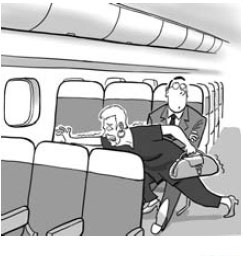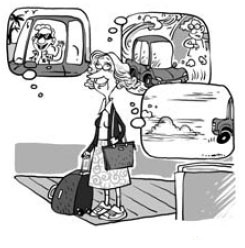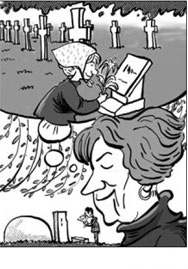Sandra Lee 《China Daily》开辟专栏(下)
时间:2009-05-25 00:00:00 来源:杭州平和 作者:Sandra Lee
简述 :以下三篇文章是我校杭州校区外教Sandra Lee在《China Daily》上的新作,敬请读者赏析……
“HOT POT”专栏(七)
My divided heart and the place I call home
By Sandra Lee (China Daily)
Updated: 2009-04-29 07:48
When I left China for a visit home and landed at the airport on Kauai, Hawaii, I was teary-eyed at being "home again". Leaving there and arriving on mainland America, I said to myself, "Ah, home". Returning to my apartment in China, I sighed and thought, "Gosh, it's good to be home."
If home is where the heart is, then I have a divided heart after eight years of living and working in China and becoming a visitor at those other places I call home, Kauai, and mainland America. I now experience culture shock wherever I go!
|
|
The Kauai airport is small and everyone is smiling and friendly. There's sweet music playing and the scent of flowers permeates the soft air. On Kauai I must remember to go very, very, slowly. When driving, it takes time to get used to people stopping and waving you on ahead of them at intersections - with a big smile. "Hawaiian time" means we get there when we get there. No hurry, no worry. You go first.
The minute I am in the airport in America I can feel the pressure of time. Everyone seems focused and in a hurry, walking briskly. Renting a car is super-easy but pulling out from the lot into the freeway traffic and going
Returning to China, the noise, confusion and hordes of people seemingly all rushing to the same spot in a pack is maddening. The drive in the taxi reminds me that there are seemingly no rules of the road and apparently everyone is out for themselves. Death can seem imminent. Three different places, three different paces. Three different cultures. All of them feel like home - but not quite. It is the price and also the pleasure of the wanderer. Each place both delights and aggravates. There's familiarity and also the sense of not quite belonging. Each port of call has me rushing to a favorite eatery, Hammura's Saimen on Kauai, Brophy's Seafood in Santa Barbara and jaozi or mian anywhere in China. Kauai, America and China all hold people dear to me. Skype and e-mail help to keep current with those I'm away from but I try to keep loneliness at bay by focusing on those I'm with in the here and now. No matter how much I'm anticipating going "home" I miss each place and the people (and the food) the minute I leave. I have developed a form of multiple personalities, each of which shows itself in the different settings. Years ago someone asked actress Bette Davis how she managed to be away from home so much. She said that she always took a small box of familiar items with her, framed photographs, a scarf she puts over a lamp, bits and pieces of things. Even if she was only staying overnight she got them out. This meant she felt "at home" wherever she was. I'm a "nester" and I remembered that, so I've done the same as I switch homes. It helps. Familiar things evoke familiar faces and places. Feeling "at home" can be a state of mind, and for expats, it's crucial to develop it in order to fully enjoy the experience of living far, far away from what we call "home". Or, used to. China is noisy and confusing, always surprising and holds incomparable beauty. Kauai is warm and friendly and a bit too slow sometimes. America is clean, quiet and polite, but expensive and somewhat boring in its predictability. To be "at home" with such diverse cultures requires a weird ability to both connect and disconnect in the course of a plane ride. Not always an easy thing to do. Which "home" do I prefer? Why, the one I'm in at the moment, of course! (China Daily “HOT POT”专栏(六) Space: the final frontier, but not as we know it here By Sandra Lee (China Daily) On a flight to Europe last summer, I was seated between two middle-aged Chinese men. The man in the aisle seat didn't make eye contact, get up or in any way acknowledge my existence, nor did the man in the window seat. They both sat with arms folded, staring straight ahead. To get to my seat I climbed over the legs of the first one and as I did so, my bag flew out of my hands and landed in the lap of the other guy. I was trying desperately to apologize but neither would so much as glance at me! The flight was off to the worst possible start and I was terribly embarrassed. Traveling on a bus or train in China, I've experienced a similar personal space puzzle. Most travelers choose the aisle seat and, as the vehicle fills up, will not move to the window seat. Instead, the next person has to climb over the legs of the first passenger who is often oblivious to the problem since there is no eye contact or communication. According to the experts, I'm sensitive to this because as an American I require more personal space and eye contact than any other group. This may well be so, because it took me a long time to get used to situations where close public body contact was the norm, not the exception. We even have a saying to describe someone who is too close or too angry to stay the "appropriate" distance away. We say they are "in my face.”
Updated: 2009-04-15 08:04

When queuing, I notice that many Chinese are comfortable right up against the people in front and behind. Glaring doesn't seem to get me anywhere in these circumstances and I'm sure people wonder what my problem is, as I try to make some space around me.
The study of personal space is called proxemics, a term coined by anthropologist Edward T. Hall. Studying what is one's comfort zone, he concluded that I need at least 1.2
Here is the variable: I'm a hugger. In Hawaii, I fit right in. Everyone hugs everyone else all the time. In my birthplace, New England, where showing emotions is suspect behavior, I am a distinct nuisance. One of my sisters noticeably braces herself when we meet. She murmurs, "just one hug," as she endures my need to make that contact.
In China, if I forget where I am and hug someone on meeting them, they usually freeze and simply don't know how to react to such an aberration of acceptable behavior. We are both embarrassed. Some of my Chinese friends have come to accept my hugs but some have not.
A term called "spatial empathy" was first coined by foreigners in Hong Kong who had great difficulty adjusting to being in close bodily contact with others at the incredibly crowded streets, markets, shops and official buildings. It's pretty amusing to think of those Brits and Europeans trying to navigate the narrow alleyways of old Hong Kong without touching anyone - and having all and sundry staring at them and laughing.
In truth, we are all creatures of habit. What feels right to me feels wrong to you. Sometimes, though, the logic is hard to identify. I don't like to be pressed up against in a line or a crowd but on the other hand I can easily hug strangers. I don't think even proxemics can find an easy label for that!
(China Daily
The Qingming of my childhood days in America
By Sandra Lee (China Daily)
Updated: 2009-04-02 08:08
The first I ever heard of the Qingming Festival, which falls this Saturday, was when I was told my colleague was going home for the Tomb Sweeping Festival. I was in Hong Kong during that time and the hillside cemeteries looked like campfires were burning. I was a bit alarmed until a friend informed me that people were just burning up the sweepings from the gravesites and then burning paper offerings and joss.
Last year during Qingming, I was driving through the countryside on my way to a day of hiking. The hillsides were lively with people coming and going, carrying flowers and brooms. I was struck by the similarity to a much anticipated day in my childhood, Memorial Day. This American national holiday began after the Civil War and honors deceased soldiers on the last Monday in May.
|
|
Living in a small community, we children were eager for excitement. On Memorial Day we took flowers from our yards, usually lilacs, since little else was blooming yet in that northern clime. Lessons were suspended so that we could join the military veterans of our town. The children and most townfolk all walked solemnly with them to the small stone etched with the names of our town's servicemen who had died. Many families had someone memorialized there.
A trumpeter played the mournful song, Taps, a veteran laid a wreath on the stone and we all held our hands over our hearts. Then we all walked the mile or so to the town cemetery. Someone shot a rifle for the traditional 21-gun salute given to fallen soldiers. Candles were lit at each of their graves.
When I see how much it means to the Chinese people to have this day to honor their ancestors, I wish I'd been a bit more reverent as a child. When I was raising my children, we lived far from where my family was buried, so I fear I didn't raise them with any real sense of feeling connected to our departed relatives. We lived in a much bigger town, so while their school did honor Memorial Day, it was by watching a parade. Watching is so different from feeling part of something as I did as a child.
I envy the Chinese families I see who come together as several generations follow hallowed rituals. It may be that the younger members are more interested in running around, as we were, but they will look back on these occasions with great nostalgia as they, someday, bring their little ones to the site of their ancestral history. Modern life can be so confusing, changing so fast, a family which pauses once a year to honor those who have gone on before, gives a message of continuity.
I think it says: "We were, we are, and we will be family. On this spot you, too, may rest someday surrounded by loved ones. You will always be cared for here."
I didn't give that to my children because we were so far away from our hometown, chasing the American Dream of prosperity. As more Chinese travel far to chase the Chinese Dream of prosperity and are unable to join their families at Qingming, will some of them someday feel the regret that I feel ?
(China Daily
Editor:Rebecca
本文链接:https://www.pinghe.com/AboutGLV/GLVState/2010-08-12/565.html
更多内容
- 我校入选杭州市特色品牌建设项目2010-08-04
- 本来就有爱2010-08-03
- 贺平和蝉联“十大知名外语培训机构”称号2010-08-03
- 新华网:教师节与平和外教切磋教学2010-07-31
- 《东莞时报》去平和英语村学英语2009-10-26
马上评估您的学习费用



 全部课程
全部课程








 粤ICP备11066329号-2
粤ICP备11066329号-2
 粤公网安备 44040202000471号
粤公网安备 44040202000471号
